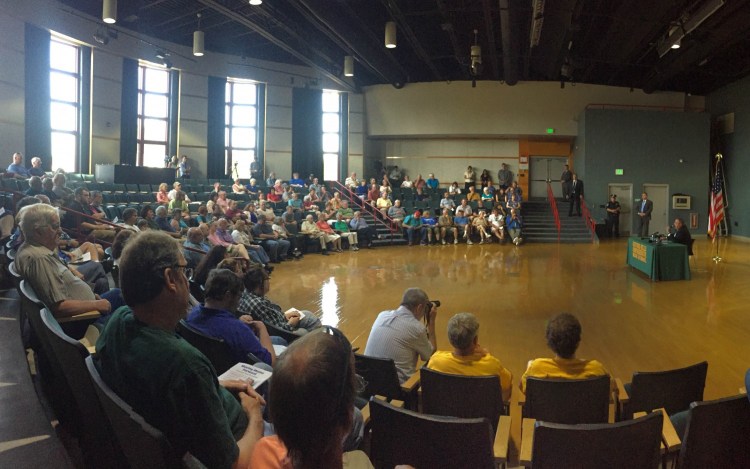PARIS — Gov. Paul LePage says most of the 2,300 jobs he is proposing to eliminate from the next state budget already are vacant positions.
Although the Legislature has rejected key pieces of LePage’s past budget proposals, the administration already has succeeded in shrinking the size of state government. Since 2010, the average number of state workers has decreased roughly 14 percent, from 12,999 to 11,211.
Democratic opponents said LePage is risking public safety if he pushes the total number of executive branch employees down to just 9,500 workers, as detailed in a memo from a top LePage staffer that was leaked to the media.
Speaking at a town hall meeting Wednesday night at Oxford Hills Comprehensive High School, LePage also confirmed a suggestion in the memo that he would again seek to lower the state’s highest income tax bracket from 7.19 percent to 5.75 percent. He said he would consider another attempt at increasing the state’s sales tax to offset any lost revenue.
Democratic lawmakers continued Wednesday to criticize LePage’s efforts to further cut state jobs in light of recent rosy financial data and previous reductions in staff.
“The number of state employees has been cut significantly in the last 10 years,” said Rep. Peggy Rotundo, D-Lewiston.
Rotundo, the outgoing House chairwoman of the Legislature’s budget-writing Appropriations Committee, said LePage’s proposal was “irresponsible.”
“A cut of that magnitude would jeopardize the health and safety of the people of Maine,” Rotundo said. “At a time when public safety is of such importance to Maine people, why would you jeopardize their safety to provide a bigger tax break for the wealthy?”
LePage said Wednesday the jobs he was looking to eliminate “were all vacant jobs.”
However, David Heidrich, spokesman for the state Department of Administrative and Financial Services, said reducing the number of executive branch employees to 9,500 would result in the elimination of currently filled positions.
LePage said there were about 13,000 jobs in the current budget, but only about 11,000 were filled.
“So I took 2,000 jobs out,” he said Wednesday night. “The Legislature put them back in.”
LePage said leaving vacant positions in the budget was a strategy that lawmakers used to create revenue surpluses so they could then sweep the money for their “pet projects.” He went on to explain that only about 8,500 of the jobs in question are permanent full-time jobs. He said others are part time or temporary and some were funded only for short periods by federal grants.
LePage confirmed that the state was going to close the year out with a solid revenue surplus, but bemoaned the fact that much of it already had been spoken for by laws enacted over his vetoes.
As of Tuesday, the state had a cash balance of about $153 million, but only about $93 million of that would land on the “surplus” side of the ledger, Heidrich said.
“That we are in the black is good news to me,” said State Treasurer Terry Hayes, noting a strong cash balance made it easier for the state to invest as well as avoid borrowing for short-term operating costs.
But ultimately only $777,000 would be filtered into the state’s “rainy day” fund, bringing that balance to about $112.4 million. LePage had hoped to put as much as $72 million into the fund this year.
“Unfortunately, the surpluses disappear overnight,” LePage said at the town hall. “Because we have this thing in Maine we call ‘cascading,’ which is simply on the last day of the (fiscal) year they add up how much money we saved and then the cascades is put in by the Legislature, actually by the appropriators, and they all have a little pet project they want, so they spend the money, or most of it. I also call it Christmas in July.”
LePage said that as income taxes were reduced, state revenues went up. “Funny how that works,” he said. But later he mentioned how the state’s Department of Transportation also spent about $10 million less this year on plowing because of a mild winter. He said that money would be used to repave an additional 62 miles of state highway that was not scheduled for this year.
Heidrich noted that the Legislature passed a law that would move another $10 million into the rainy day fund from a lawsuit settlement account in the state Attorney General’s Office. It was a funding shift that Maine Attorney General Janet Mills proposed on the last day of the lawmaking session, allowing the Legislature to reach a compromise.
Copy the Story LinkSend questions/comments to the editors.



Success. Please wait for the page to reload. If the page does not reload within 5 seconds, please refresh the page.
Enter your email and password to access comments.
Hi, to comment on stories you must . This profile is in addition to your subscription and website login.
Already have a commenting profile? .
Invalid username/password.
Please check your email to confirm and complete your registration.
Only subscribers are eligible to post comments. Please subscribe or login first for digital access. Here’s why.
Use the form below to reset your password. When you've submitted your account email, we will send an email with a reset code.